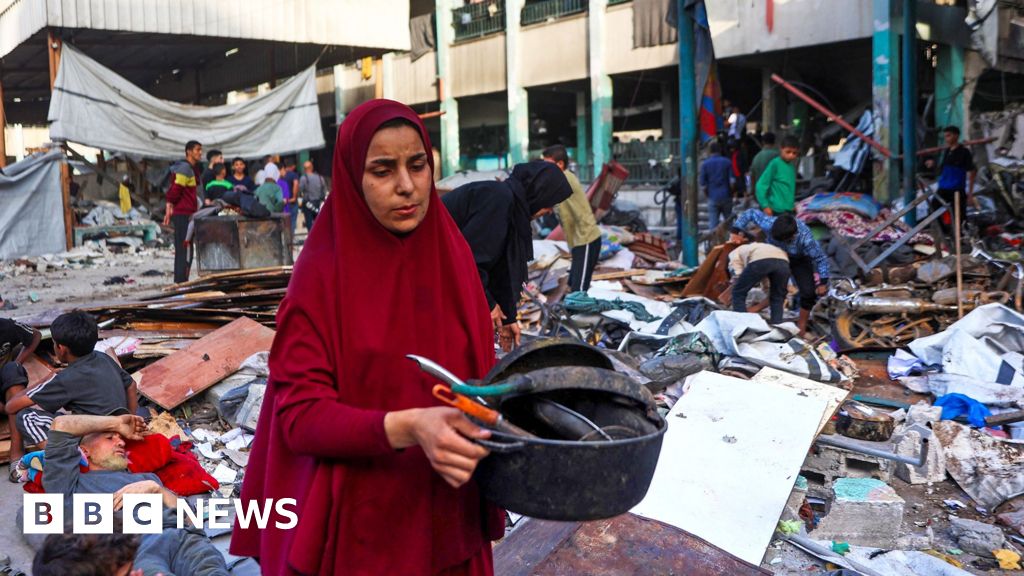EU says Israeli strikes in Gaza 'go beyond what is necessary' to fight Hamas

Quick Read
EU says Israeli strikes in Gaza 'go beyond what is necessary' to fight Hamas
**EU Condemns Israeli Strikes in Gaza: A Necessary Response or Excessive Force?**
The European Union has issued a strong statement condemning the recent Israeli strikes in Gaza, expressing serious concern over the escalating violence and asserting that the scale of the attacks seems to exceed what's justifiable in the context of the ongoing conflict. This declaration, released late yesterday, marks a significant escalation in international criticism of Israel's military actions in the region, prompting a heated global debate about the proportionality of the response to Hamas attacks.
**Escalating Tensions and International Outcry:**
The conflict between Israel and Hamas has been a volatile flashpoint for years, but the current surge in violence has sparked widespread condemnation and calls for a swift de-escalation. The EU's statement follows a series of escalating events, including a barrage of rockets fired by Hamas into Israeli territory and subsequent Israeli retaliatory strikes in Gaza. The sheer scale of destruction and civilian casualties following the Israeli offensive are what have particularly fueled international concern, prompting the EU to publicly question whether the response was truly proportionate. This is a significant departure from past responses, indicating a growing international unease with the ongoing situation.
**The EU's Concerns: Beyond Proportionality:**
The heart of the EU's concern lies in the perceived disproportionate nature of the Israeli military response. While acknowledging Israel's right to defend itself against attacks, the statement emphasizes that the response should be proportionate to the threat faced. The EU has raised specific concerns regarding reports of civilian casualties and the destruction of infrastructure vital for civilian life. The statement hasn't directly accused Israel of war crimes, but the language used strongly suggests a belief that international humanitarian law may have been violated.
* **Civilian Casualties:** The number of Palestinian civilians killed and injured in the Israeli strikes has been a major focus of international attention. Independent organizations and human rights groups are currently working to verify these figures and assess the extent of civilian casualties, adding further fuel to the debate.
* **Infrastructure Damage:** The destruction of crucial infrastructure, including hospitals, schools, and water treatment plants, has added another layer of complexity to the situation. These attacks, if confirmed, could be construed as violating international humanitarian law, which prohibits attacks on civilian infrastructure.
* **International Humanitarian Law:** The EU's statement implicitly points to potential breaches of international humanitarian law, and this brings the ongoing conflict into the realm of international jurisprudence. It places Israel in a difficult position where it must justify its actions within the framework of these well-established legal parameters.
**Global Implications and Calls for De-escalation:**
The EU's condemnation is not an isolated incident. Other international bodies and governments have echoed similar concerns, highlighting the urgent need for a ceasefire and a return to diplomatic solutions. The international community is increasingly concerned that the current trajectory could lead to further instability, potentially impacting the broader Middle East region. The ramifications extend beyond the immediate conflict, raising anxieties about global security and international cooperation.
**A Path Forward? The Urgent Need for Diplomacy:**
The situation remains incredibly volatile and requires immediate diplomatic intervention. The EU's statement serves as a clear message to all parties involved that a measured and proportionate response is crucial. It’s a call for a return to dialogue, emphasizing the need to prioritize the protection of civilians and prevent further escalation. The path forward relies heavily on robust international efforts, and engaging all relevant parties in peaceful conflict resolution remains the only viable option to avert a wider and more devastating conflict. The EU, along with other international actors, must continue pushing for a peaceful resolution and for accountability in the face of any violations of international humanitarian law. Only then can we hope to see an end to this deeply disturbing escalation.
```
```
```
```
```
```
```
```
```
```
```
```
```
```
```
```
```
```
```
```
```
```
```
```
```
```
```
```
```
```
```
```
```
```
```
```
```
```
```
```
```
```
```
```
```
```
```
```
```
```
```
```
```
```
```
```
```
```
```
```
```
```
```
```
```
```
```
```
```
```
```
```
```
```
```
```
```
```
```
```
```
```
```
```
```
```
```
```
```
```
```
```
```
```
```
```
```
```
```
```
```
```
```
```
```
```
```
```
```
```
```
```
```
```
```
```
```
```
```
```
```
```
```
```
```
```
```
```
```
```
```
```
```
```
```
```
```
```
```
```
```
```
```
```
```






